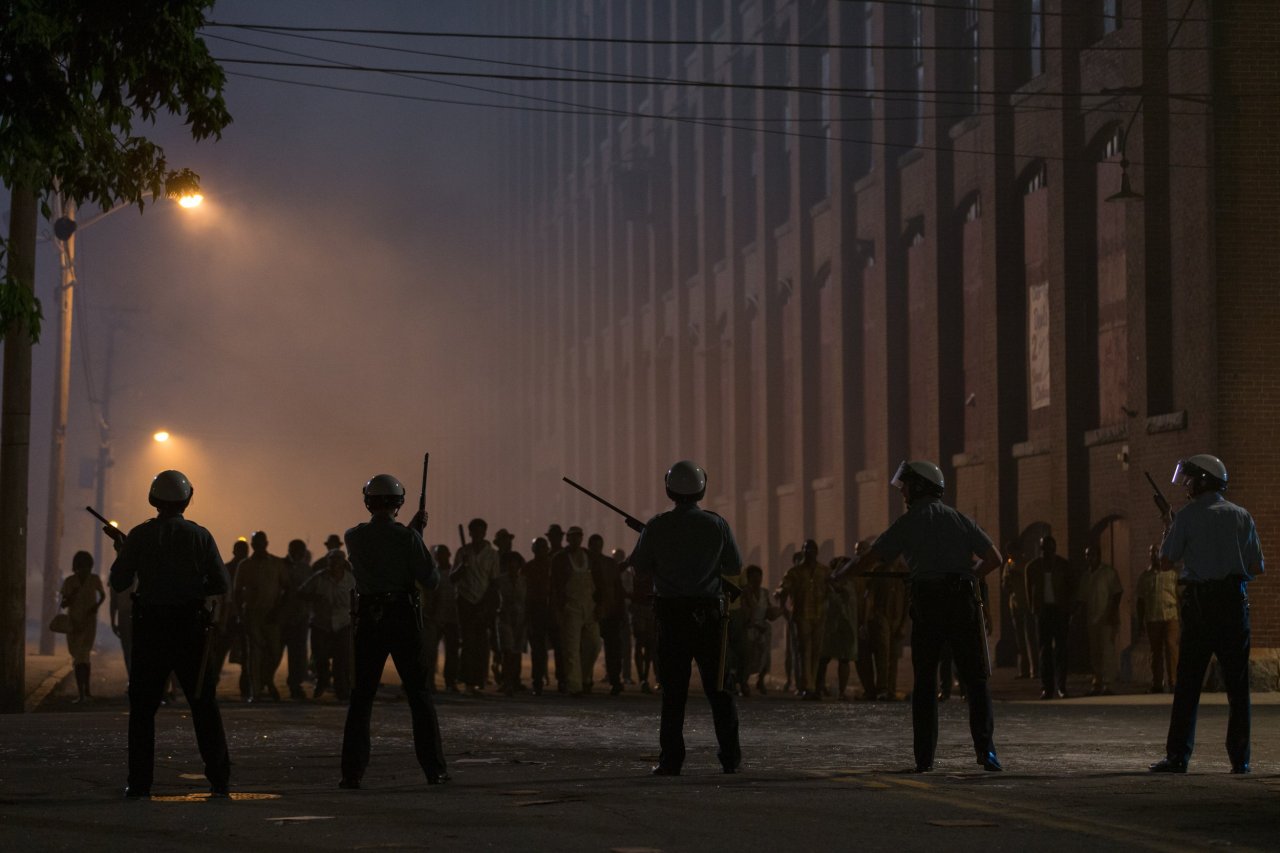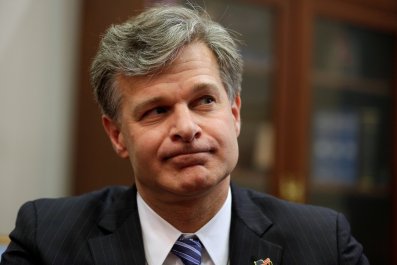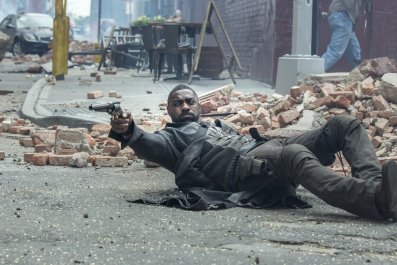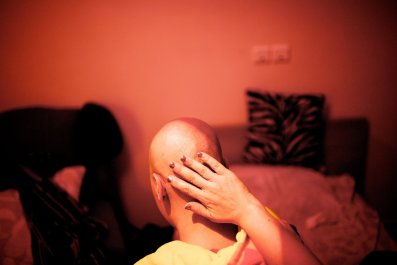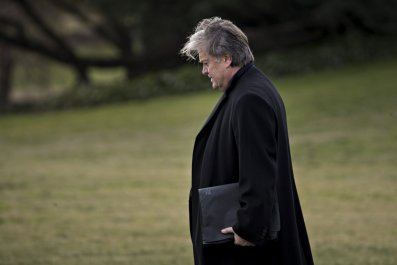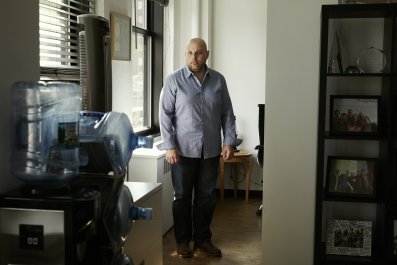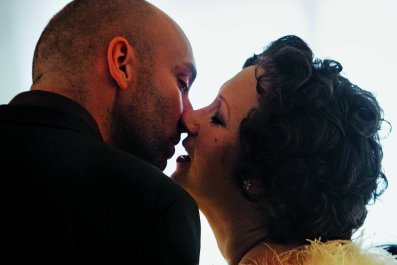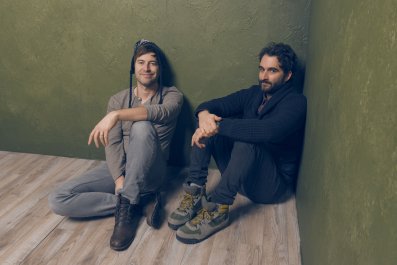Detroit is a film about war. So were the previous two collaborations between director Kathryn Bigelow and screenwriter Mark Boal, The Hurt Locker and Zero Dark Thirty. Like its predecessors, Detroit is concerned with the awesome ways in which state power is wielded by and against individuals. This time, though, the battle is not over the Arab world but an American city.
The film is based on real events—the racial unrest (you can call it a riot; the filmmakers call it a rebellion in an introductory note) that took place 50 years ago, in July of 1967. It began with a police raid on an unlicensed, after-hours bar on Detroit's Near West Side, a neighborhood of mounting tension after decades of mistrust between local citizens and mostly white cops. In the early morning hours of July 23, the bar was hosting a celebration for service members returning from Vietnam. Angry locals, exhausted by persistent police excess, gathered outside to watch the patrons being packed off to jail. As the cops drove away, bottles flew. That escalated into fires, looting and violence, with the National Guard and state troopers called in. After four days, 43 people were dead, most of them black.
Bigelow begins with the big picture, literally: The film opens with an animated sequence of painter Jacob Lawrence's acclaimed series on the Great Migration. These explain, with pithy eloquence, how millions of African-Americans migrated from the Jim Crow South to cities in the North, where they hoped to find jobs and a higher quality of life. Instead, they were faced with the same racism they'd fled, only more insidious because it was more subtly expressed.
Bigelow quickly shifts to the miniature. After several scene-setting episodes that show the riots spreading through the city, she settles in the Victoria Park section of the city, at the black-owned Algiers Motel, where our main characters have gathered to wait out the violence: a dozen people, including several members of a doo-wop group, the Dramatics, two young white women and a Vietnam veteran, played by Anthony Mackie, the terrific actor who also starred in The Hurt Locker.
Everyone inside the Algiers is partying, almost oblivious to the chaos outside. But then, as a joke, one of the men fires his starter pistol at the Guardsmen and police officers gathered a few blocks away. To the soldiers, it sounds like an assault. They return fire, then storm the motel, along with local cops and Michigan State Police troopers. The man who shot the starter pistol, the unlucky joker, is killed immediately. But the local cops, who take command of the situation, can't find the gun. The night has only begun.
At this point, Detroit becomes Algiers Motel. The incident—which would result in three black men dead and nine horribly beaten—has already been the subject of a 1968 book, The Algiers Motel Incident, by Hiroshima author John Hersey. It should make for compelling cinema. So why doesn't it? Because the viewer already knows that no real gun exists, and that the police will do anything to justify their violence.
Bigelow does far too little to complicate our expectations. The lead bully among the cops, Krauss (played by an eternally sneering Will Poulter), is exactly the racist bully you've known him to be since the opening of the film, when he shoots a looter in the back, killing him. Reprimanded by a senior detective with a sense of dignity, Krauss is allowed to return to the streets of Detroit, where crooked cops are apparently better than no cops at all. Later, at the Algiers, he is too stupid to see how his escalating violence is going to spell his own doom.
It's not that we need to understand Krauss, or to explain his racism and violence. But for view- ers expecting some deeper truth about what happened 50 years ago, and what is still happening today, a cartoonish cop—just a thug with a gun and badge—is not enough.
Frankly, Detroit could have used more Detroit, more of the panoramic view Bigelow teases at the movie's opening. The scenes of the police abusing the innocent guests at the motel are meant to enrage the viewer, and at first they do, but they occupy the better part of this two-hour film and, before long, the discomforting realization is that you've grown bored by the relentless brutality.
Was Bigelow, who is white, the right person to make this movie? The question seems inevitable, given the intense debate over cultural appropriation, but also impossible to answer. Race doesn't have to be a barrier: In American Pastorial, Philip Roth wrote beautifully about racial unrest in 1967 Newark. And Loving, by the white director Jeff Nichols, is an indelible statement on the crushing effects of bigotry.
What's missing from Bigelow's film is not sensitivity but nuance. Her characters never come alive, moving through the film less as people than entries in a sociology textbook. It's an especially striking shortcoming because Bigelow was so good, in both The Hurt Locker and Zero Dark Thirty, at intensely engrossing deconstructions of people far outside her experience. If Bigelow could get inside the minds of soldiers suffocated by post-traumatic stress disorder, as she did so capably in The Hurt Locker, she can get into the mind of anyone. In Zero Dark Thirty, she made even CIA interrogators likeable. The characters in Detroit, though, black and white, are as flat as the plains of the Upper Midwest.
It's especially disappointing how little on-screen time Mackie gets. As his Vietnam vet character stoically endures the cruelty of the cops, he exposes reserves of a deeper anger, hinting tantalizingly at what the actor could have done with a more dimensional role.
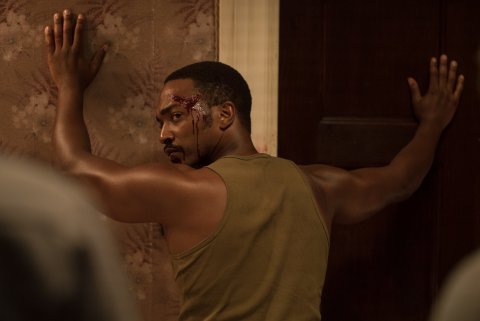
At points, Bigelow inserts documentary footage—Michigan Governor George W. Romney, for example, condemning the "hoodlumism" of those July days. But Romney's comment stands unexamined and unchallenged, and the political ramifications of the riots are never explored, making such clips feel jarring and random. Bigelow's palette here tends to faded color and gives Detroit the quality of found footage. That, along with the news clips, suggests how badly she needs the crutch of real footage to bolster her film.
The philosopher Theodor Adorno said there could be no poetry after Auschwitz. In fact, the worst human barbarism demands our best creative efforts, lest ugliness win out. But transformational art demands the courage to go beyond the obvious, to challenge clichés and stereotypes. That is what's missing from Detroit.
Detroit opens in select theaters July 28th, and nationwide August 4.


